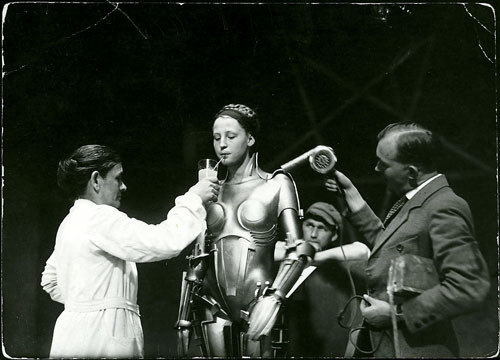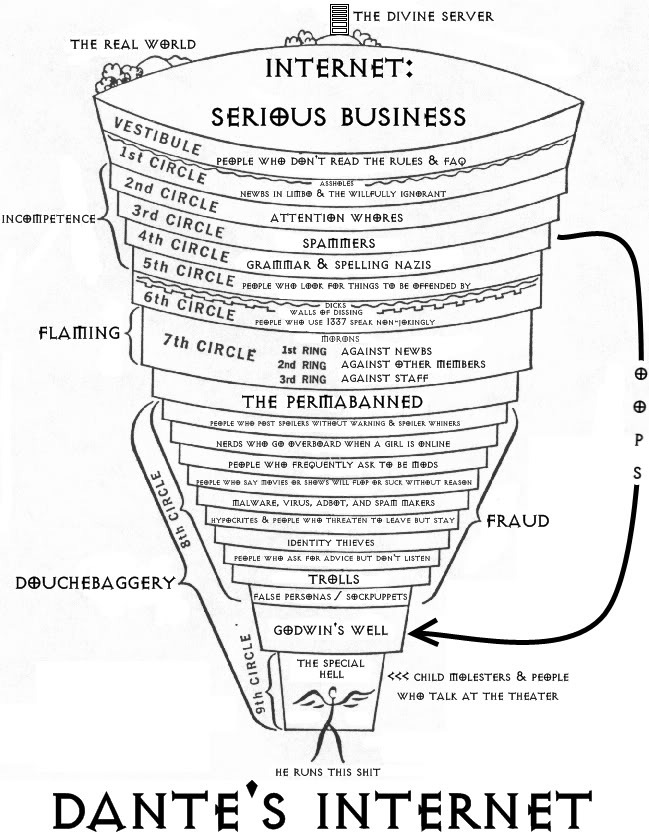Monday, November 29, 2010
Friday, November 26, 2010
An Animated St. Trinian's
We're already talked about Ronald Searle's St. Trinian's. Well, here's a treat: an animation test based on Searle's style. Wonderful!
Monday, November 22, 2010
Dark Roasted Biscotti
Here's yet another of my takes on doing a Biscotti for the always-wonderful Dark Roasted Blend. I have to say these are a real kick and a treat to put together!
Tuesday, November 16, 2010
Monday, November 15, 2010
Sunday, November 14, 2010
Tuesday, November 9, 2010
Kit O'Connell Likes The Bachelor Machine
And The Bachelor Machine publicity continues! This one, though, is very special: a review by my great pal, Kit O'Connell, on the SF Review Site, about the first edition of The Bachelor Machine,. Kit also wrote a wonderful, and touching, forward to the new edition.
Justine is a high-priced hooker that is wired for a perverse but unique kind of thrill. Thanks to extensive implants and modifications (such as rerouting of arteries and internal oxygen tanks), she can have her throat slit by a client who can then fulfill necrophilic fantasies on a body that can wake up again, save them from criminal charges, and collect a hefty fee. In M. Christian's story "Everything But the Smell of Lilies," her pimp asks her to stage a distraction from a crime and act as a real victim, placing her in the hands of a paramedic with a taste for actual corpses. Suddenly, the difference between even a realistic simulation and the genuine article is brought into sharp focus. M. Christian relishes these kinds of subtle distinctions and moral conflicts, and they appear again and again in The Bachelor Machine, this widely published erotica author's first science fiction anthology.
In the last century, technology brought countless changes to human sexuality from the refinement of the vibrator to the invention of Viagra. Culturally, the ongoing revolution in the rights of women and gays in and out of the bedroom and the rise of the AIDS virus makes sex seem like at once a more wonderful and dangerous experience than ever before. It is surprising then that more science fiction writers do not speculate on the implications of tomorrow's technological and social innovations, but it is clear from The Bachelor Machine that Christian is not just well-traveled in this strange country but a native of the territory.
The author is not content to merely use the trappings of the genre to set up a cheap erotic thrill. Each story is relatively short, but the sex always relies on the technology and both exist to further the plot and development of character. In Christian's hands the kinkiest acts can be the sweetest, and the most vanilla of couplings can suddenly seem twisted."Eulogy" is set in a future where death is almost unheard of, and a consensual act of oral sex becomes repugnant when we learn that both partners are aware that the recipient of the act carries a rare and truly fatal sexually-transmitted disease.
The use of technology is equally deft. M. Christian clearly loves imagining new uses for implants, cybernetic augmentation, and wearable computing. In the haunting "Winged Memory," a prostitute wears 'whoreware,' which includes a bracelet that charges cash cards and eyewear that cycles from green to red when a client's time is up. Concepts like sexual orientation are turned on their ear in stories such as "Fully Accessorized, Baby," where two women make love with fully functional prosthetic penises and a cybernetic arm made of teak. Some partners lack gender entirely, as in the entirely cybernetic soldier and his equally machine partner who appear in "Skin-Effect."
The writing is at once skillfully sensual -- with sex that never becomes repetitive or boring -- and quick, direct, and razor-sharp enough to remind one of cyberpunk's finest moments. I never felt as though I was being lectured about the setting; instead we discover it directly through the eyes of each story's protagonist. Even the quickest and raunchiest of the stories resonate with deeper themes and subtle nuances that urge continued reflection and repeat readings. "Technophile" deserves to go down in history for bearing one of science fiction's immortal opening lines: "I almost lost my virginity at fifteen, but his batteries ran low;" it also displays both Christian's tender side and his sense of humor. This story concerns a young man who begins his first sexual explorations with a lover whose genitals are incompatible with the wiring in his home.
It is hard to pick out weaknesses in such a strong debut collection. A few stories suffer slightly from their brevity and would probably have been more effective as longer works. I also felt the collection was lacking in contextual information, such as a list of when and where stories first appeared in print; some are previously published and some appear here for the first time but there is no way to tell which is which. I'd also love it if the stories included some author's notes about the inspiration or ideas behind them, and the inclusion of the fascinating dialogue between Christian and Circlet Press' Cecilia Tan (an extra provided only to reviewers) would have further enhanced the volume.
The Bachelor Machine succeeds on every level as both erotica and speculative fiction; even the weakest entries entertain, shock, arouse, or amuse. If he continues writing in this vein, the author is sure to make waves within science fiction. With talent and vision to spare, M. Christian belongs on your reading list, too.
Monday, November 8, 2010
Sunday, November 7, 2010
Dark Roasted Biscotti
Here's another of my takes on doing a Biscotti for the always-wonderful Dark Roasted Blend. I have to say these are a real kick and a treat to put together!
Weirdsville On The Cud
Here's another special piece I did for the great folks at the Aussie site The Cud. This time it's about the brilliantly funny Brian G. Hughes.
"A Priest, A Rabbi, and A Minister Walk Into a Bar–"
What? You've heard that one? How about: "There once was a man from Nantucket–"
That one too? What about: "Yer Momma is so–"
Well, here's one who probably haven't ever heard, the one that starts: "There was this guy, named Brian G. Hughes..."
#
There was this guy, named Brian G. Hughes. He was an Einstein, a Salk, a Beethoven, a da Vinci – but he wasn't a physicist, a doctor, a composer, or a painter. He was, according to the society pages, a rather wealthy box manufacturer and a banker. But his genus wasn't in cardboard or playing the market.
New York around the turn of the previous century was a pretty dull berg, full of overly stuffed shirts and far-too-puffed-out egos. It was a dull place, a humorless place, a terribly stiff place – a city, and a society, that Brian G. Hughes saw as needing to be seriously goosed.
And goose it he did: with a flare and a flamboyance that shook New York from Battery Park to Queens. Take for instance the time he donated a plot of valuable Brooklyn real estate to the city, to be made into a public park. Great gesture, right? Fine civic spirit, correct? That's what the Board of Aldermen thought – until they actually took the time to check it out. See, the plot of land Brian G. Hughes had donated was only a two-by-six foot plot. Hey, he never said it would make a big park ...
Then there was the time he donated a mansion to a few well-respectable historical societies, one he claimed the Marquis de Lafayette had lived in during the War of Independence. "Wow" went the Ladies of those Historical Societies, "What a find." Until they checked out the real estate and discovered the mansion was actually a dilapidated flophouse in the Bronx. Seriously lacking in the giggle department, the ladies tried to have him committed. Now there was a hearing worth attending.
But real estate wasn't the only thing Hughes used in his pranks. For instance, he would routinely hang out in front of Tiffany's and drop boxes of fake jewels – just to watch people scramble to snatch up the supposed treasures. Another time he left a set of burglar tools out in front of a building. Nothing special in that, right? Well, the building was the Metropolitan Museum of Art, which prompted the – no doubt humorless – curator to close the entire landmark to frantically search for any missing paintings.
Love cats? Well, Mr. Hughes did – though he hated the pomposity of cat shows. One time he entered what he claimed was a spectacularly rare species. The whole of New York was buzzing about this feline masterpiece, and it even won a ribbon, though later on it was revealed that the cat, "Nicodemus, by Broomstick out of Dustpan by Sweeper, the last of the exotic Brindle breed," had actually been a common stray bought from a hobo.
Love horses? Well, Mr. Hughes ... I think you know where this might be going. His "Orphan Puldeca, out of Metropolitan by Electricity" thoroughly impressed the horse show crowd, until one sharper-than-average person figured out that "Orphan Puldeca" meant "Often Pulled the Car" and Hughes admitted that his entry was a noble example of a simple trolley horse.
Say you happened to be in a downtown establishment during, alas, a totally unexpected downpour. Why, look over there: a lovely – and apparently unclaimed – umbrella. It wouldn't be theft, you argue with yourself. You'll bring it right back, you conclude. Except that the instant you opened the umbrella, one of hundreds placed around the city, a banner would unfurl proclaiming that the bumbershoot had been STOLEN FROM BRIAN G. HUGHES.
While Mr. Hughes was, no doubt, a charming person to know it was best not to accept tickets from him as he was known to (tee-hee-hee) print up hundreds different ones to all kinds of events – which never existed.
Then, perhaps the capper to a wonderfully colorful career keeping the too-well-heeled on their toes and putting pepper up the noses of the upper-crusts, he announced that he – at considerable expense and at tremendous personal risk – would embark on an expedition to deepest and no-doubt darkest South American in pursuit of the elusive reetsa.
For weeks New York was on the edge of its manicured toes, gasping in excitement into its perfumed handkerchiefs, as word of the Hughes expedition was leaked out until, just as high society feared they could take no more, it was announced that Hughes would be returning to the island – with a living, breathing resets!
The city was aghast, the city was amazed, the city was riveted. By the thousands they came down to the docks to watch Hughes return, triumphant, from his perilous journey. Then, those crowds frozen in suspense, the ship arrived and Hughes made his triumphant appearance – with is captured reetsa...
There was this guy, named Brian G. Hughes, who convinced all of New York City that he'd traveled to South America to capture the mysterious reetsa – that turned out to be a simple farm animal, which he led down the gangplank backwards. Reetsa, naturally being "a steer" spelled backwards.
Here’s to you, Brian G. Hughes: the man who made an island laugh, a whole city giggle, who brought practical jokes to a whole new, and gloriously special, level: truly the last of a very special exotic brindle breed.
"A Priest, A Rabbi, and A Minister Walk Into a Bar–"
What? You've heard that one? How about: "There once was a man from Nantucket–"
That one too? What about: "Yer Momma is so–"
Well, here's one who probably haven't ever heard, the one that starts: "There was this guy, named Brian G. Hughes..."
#
There was this guy, named Brian G. Hughes. He was an Einstein, a Salk, a Beethoven, a da Vinci – but he wasn't a physicist, a doctor, a composer, or a painter. He was, according to the society pages, a rather wealthy box manufacturer and a banker. But his genus wasn't in cardboard or playing the market.
New York around the turn of the previous century was a pretty dull berg, full of overly stuffed shirts and far-too-puffed-out egos. It was a dull place, a humorless place, a terribly stiff place – a city, and a society, that Brian G. Hughes saw as needing to be seriously goosed.
And goose it he did: with a flare and a flamboyance that shook New York from Battery Park to Queens. Take for instance the time he donated a plot of valuable Brooklyn real estate to the city, to be made into a public park. Great gesture, right? Fine civic spirit, correct? That's what the Board of Aldermen thought – until they actually took the time to check it out. See, the plot of land Brian G. Hughes had donated was only a two-by-six foot plot. Hey, he never said it would make a big park ...
Then there was the time he donated a mansion to a few well-respectable historical societies, one he claimed the Marquis de Lafayette had lived in during the War of Independence. "Wow" went the Ladies of those Historical Societies, "What a find." Until they checked out the real estate and discovered the mansion was actually a dilapidated flophouse in the Bronx. Seriously lacking in the giggle department, the ladies tried to have him committed. Now there was a hearing worth attending.
But real estate wasn't the only thing Hughes used in his pranks. For instance, he would routinely hang out in front of Tiffany's and drop boxes of fake jewels – just to watch people scramble to snatch up the supposed treasures. Another time he left a set of burglar tools out in front of a building. Nothing special in that, right? Well, the building was the Metropolitan Museum of Art, which prompted the – no doubt humorless – curator to close the entire landmark to frantically search for any missing paintings.
Love cats? Well, Mr. Hughes did – though he hated the pomposity of cat shows. One time he entered what he claimed was a spectacularly rare species. The whole of New York was buzzing about this feline masterpiece, and it even won a ribbon, though later on it was revealed that the cat, "Nicodemus, by Broomstick out of Dustpan by Sweeper, the last of the exotic Brindle breed," had actually been a common stray bought from a hobo.
Love horses? Well, Mr. Hughes ... I think you know where this might be going. His "Orphan Puldeca, out of Metropolitan by Electricity" thoroughly impressed the horse show crowd, until one sharper-than-average person figured out that "Orphan Puldeca" meant "Often Pulled the Car" and Hughes admitted that his entry was a noble example of a simple trolley horse.
Say you happened to be in a downtown establishment during, alas, a totally unexpected downpour. Why, look over there: a lovely – and apparently unclaimed – umbrella. It wouldn't be theft, you argue with yourself. You'll bring it right back, you conclude. Except that the instant you opened the umbrella, one of hundreds placed around the city, a banner would unfurl proclaiming that the bumbershoot had been STOLEN FROM BRIAN G. HUGHES.
While Mr. Hughes was, no doubt, a charming person to know it was best not to accept tickets from him as he was known to (tee-hee-hee) print up hundreds different ones to all kinds of events – which never existed.
Then, perhaps the capper to a wonderfully colorful career keeping the too-well-heeled on their toes and putting pepper up the noses of the upper-crusts, he announced that he – at considerable expense and at tremendous personal risk – would embark on an expedition to deepest and no-doubt darkest South American in pursuit of the elusive reetsa.
For weeks New York was on the edge of its manicured toes, gasping in excitement into its perfumed handkerchiefs, as word of the Hughes expedition was leaked out until, just as high society feared they could take no more, it was announced that Hughes would be returning to the island – with a living, breathing resets!
The city was aghast, the city was amazed, the city was riveted. By the thousands they came down to the docks to watch Hughes return, triumphant, from his perilous journey. Then, those crowds frozen in suspense, the ship arrived and Hughes made his triumphant appearance – with is captured reetsa...
There was this guy, named Brian G. Hughes, who convinced all of New York City that he'd traveled to South America to capture the mysterious reetsa – that turned out to be a simple farm animal, which he led down the gangplank backwards. Reetsa, naturally being "a steer" spelled backwards.
Here’s to you, Brian G. Hughes: the man who made an island laugh, a whole city giggle, who brought practical jokes to a whole new, and gloriously special, level: truly the last of a very special exotic brindle breed.
Saturday, November 6, 2010
Wednesday, November 3, 2010
Tuesday, November 2, 2010
Monday, November 1, 2010
Subscribe to:
Posts (Atom)







